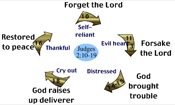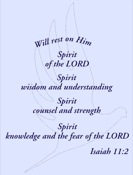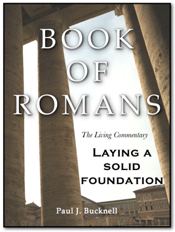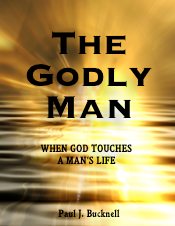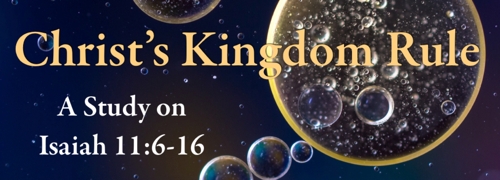
Isaiah 11:6-16 Three Interpretations
Argument #1 Word context | #2 Logical presentation
#3 Last section's timing | #4 'My holy mountain' | #5 'In that day'
Isaiah 11:6-16 Bible study questions
Isaiah Outline | Timeline | Overview | Brief Introductions
Isaiah 1-6 | 7-12 | 13-23 | 24-27 | 28-33 | 34-35 | 36-39 | 40-66
Christ's Rule: Isaiah 11:6-16
Argument #4: 'My Holy Mountain' and a Spiritual Jerusalem
Purpose
This argument of “My holy mountain” (11:9) is the fourth of five primary reasons the figurative interpretation should be used to understand and interpret Isaiah 11:6-16. If His holy mountain influences believers now, the other symbolic pictures help us glimpse God’s transformation of those who walk with Him.
What does the “holy mountain” in verse 9 refer to? If 11:6-9 refers to the New Testament age, this concept should be strongly embedded into the NT. Do we find a symbolic picture of Isaiah 11:6-9?
The work of the Spirit in the NT is a glimpse of what will come, yet it is already beginning to take shape on earth before the new heavens and earth. Christ’s remarkable transformation of the people around Him through His Spirit-anointed ministry continues into our time. The kingdom of God exists where God’s presence is seen in and through the church.
1) Christ's wonderful transformation of the people around Him through His Spirit-anointed ministry.
2) The kingdom of God (Heaven) where God's presence is seen in and through the church.
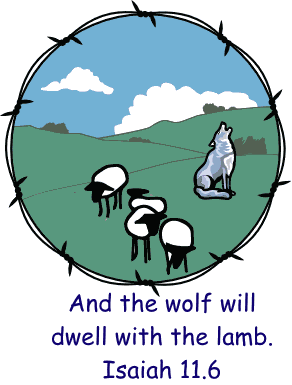 1) Christ's transformation
1) Christ's transformation
Christ transformed people around Him. God’s Spirit was released through His life (11:1-5) into the lives of others. Many believed, and together with the apostles, they became the church in Christ (1 Pet 2:4-5), the new temple of God (1 Cor 6:19).
Christ's rule would change the disciples ' lives to the degree they opened themselves to God’s Spirit. We see the reverse of the curse placed on man in the Garden of Eden, where mankind left God. God has again found mankind and put His Spirit anew within them. The wild animals during Jesus’ temptation did not bother him, indicating the introduction of the new age.
And He was in the wilderness forty days being tempted by Satan; and He was with the wild beasts, and the angels were ministering to Him. (Mark 1:13).
2) The Kingdom of God
Although some dispute the presence of the kingdom of God in the NT era, many scriptures affirm the kingdom overrun these objections. The word “kingdom” is used more than 150 times in the New Testament, 65 times as the “kingdom of God.”
"But when Jesus saw this, He was indignant and said to them, “Permit the children to come to Me; do not hinder them; for the kingdom of God belongs to such as these. “Truly I say to you, whoever does not receive the kingdom of God like a child shall not enter it at all" (Mark 10:14-15).
”But if I cast out demons by the Spirit of God, then the kingdom of God has come upon you. (Matthew 12:28).
"Strengthening the souls of the disciples, encouraging them to continue in the faith, and saying, “Through many tribulations we must enter the kingdom of God" (Acts 14:22).
We are not saying that the kingdom of God only pertains to the church’s presence on earth or its entire glory. Christ’s return will inaugurate the full manifestation of the new age. Present imperfections that we are now familiar with, like tears and death, will vanish.
My “Holy Mountain” refers to where God reveals His glorious presence. The phrase is often used in the Old Testament but only once in the New Testament from Peter.
"And we ourselves heard this utterance made from heaven when we were with Him on the holy mountain" (2 Peter 1:18).
The Old Testament “holy mountain” refers to Mt. Zion. We might conclude that it refers to Mount Sinai, but no verses suggest this. The references to Mount Zion, representing Jerusalem, start in the Psalms after Jerusalem has been chosen.
”But as for Me, I have installed My King Upon Zion, My holy mountain” (Psalms 2:6).
”O Lord, in accordance with all Thy righteous acts, let now Thine anger and Thy wrath turn away from Thy city Jerusalem, Thy holy mountain; ..." (Daniel 9:16).
Jerusalem was the mountain that God chose to establish His temple and worship center. Abraham had offered Isaac there, as God offered up His only Son, Christ Jesus. (Mount Moriah is part of Jerusalem.)
Only Peter refers to seeing Jesus on the holy mountain: “And we ourselves heard this utterance made from heaven when we were with Him on the holy mountain” (1 Pet 1:18). The scriptures do not tell us which mountain it is. It was holy because God’s glory shone upon it. This steers us away from thinking of the physical city of Jerusalem as the holy mountain that is otherwise referred to.
There is a definite switch from physical references to Jerusalem in the Gospels and Acts to a figurative place in later references. Note the different descriptions of Jerusalem below.
Highlight |
Comments |
Full Reference |
Galatians 4:25-26
the present Jerusalem, ... the Jerusalem above |
Paul’s contrast in Galatians 4 presents the New Testament era as the spiritual Jerusalem, the new worship center. Remember, he wrote this to those in Galatia, part of modern-day Turkey. People can worship anywhere because of the Holy Spirit (cf. John 4). | Now this Hagar is Mount Sinai in Arabia, and corresponds to the present Jerusalem, for she is in slavery with her children. But the Jerusalem above is free; she is our mother. Galatians 4:25-26 |
Hebrews 12:22
Mount Zion and to the city of the living God, the heavenly Jerusalem |
The heavenly Jerusalem is where God lives. Mount Zion is now a spiritual or figurative term for God's throne. | Heb 12:22 But you have come to Mount Zion and to the city of the living God, the heavenly Jerusalem, and to myriads of angels, Hebrews 12:22 |
Revelation 3:12
the name of the city of My God, the new Jerusalem, which comes down out of heaven from My God, and My new name. |
God's city is now the new Jerusalem. New is in contrast to the old. This city comes down from out of heaven. | ‘He who overcomes, I will make him a pillar in the temple of My God, and he will not go out from it anymore; and I will write upon him the name of My God, and the name of the city of My God, the new Jerusalem, which comes down out of heaven from My God, and My new name. Revelation 3:12 |
Revelation 21:2
And I saw the holy city, new Jerusalem, coming down out of heaven from God, |
The new Jerusalem is a holy city. It comes down out of heaven from God. | And I saw the holy city, new Jerusalem, coming down out of heaven from God, made ready as a bride adorned for her husband. Revelation 21:2 |
Revelation 21:10
the holy city, Jerusalem, coming down out of heaven from God, |
Jerusalem is the holy city. It again states that it comes from out of heaven, | And he carried me away in the Spirit to a great and high mountain, and showed me the holy city, Jerusalem, coming down out of heaven from God. Revelation 21:10 |
The old holy mountain, the earthly Jerusalem, is no longer the center to meet God. During the feasts, the Israelites gathered around God in Jerusalem, but now, the church gathers in small groups worldwide. God reigns from the heavenly Jerusalem—the holy city. These references incline us to assume some primary references have changed. So, which is Isaiah referring to when he refers to “My holy mountain?”
From Hebrews 12:22, we are taught that the New Jerusalem is not something just in the future, as far as the Christian is concerned. Instead, as the scriptures support, we presently live under Christ’s heavenly rule. We are Christ’s body, and though this city will descend from heaven one day to earth, it now significantly affects the life and perspective of every Christian.
Conclusion
In conclusion, God’s Holy Mountain refers to spiritual Jerusalem, where all His people congregate in the Spirit to worship despite their earthly locality and politics. God’s holy mountain is the center of God’s kingdom, which is present and future. Like Hebrews 12:22, we assert that Isaiah 11:6-9 refers to the present time under the New Covenant and those who reside in God’s holy hills.
"They will not hurt or destroy in all My holy mountain, for the earth will be full of the knowledge of the LORD as the waters cover the sea" (Isaiah 11:9).
Isaiah doesn’t refer to Christendom, the Christian religion, but to those who have known God and walked with Him. They know Yahweh and have been radically changed by Him. The emphasis on “the earth” and “cover the sea” reveals that He was including the people called Gentiles, not being part of the OT covenant of God’s people, the physical Jews.
“For this is the covenant that I will make with the house of Israel after those days, says the Lord: I will put my laws into their minds, and I will write them upon their hearts. And I will be their God, and they shall be my people. “And they shall not teach everyone his fellow citizen, and everyone his brother saying, ‘Know the Lord,’ for all shall know me, from the least to the greatest of them” (Heb 8:10-11).
In conclusion, the “holy mountain” refers to Christ’s kingdom during His time on earth and its continued presence before Him in heaven (Eph 2:6). There is a definite ongoing relationship between the king and His kingdom. We, the church, are His kingdom of priests: “and He has made us to be a kingdom, priests to His God and Father—to Him be the glory and the dominion forever and ever. Amen” (Rev 1:6).

